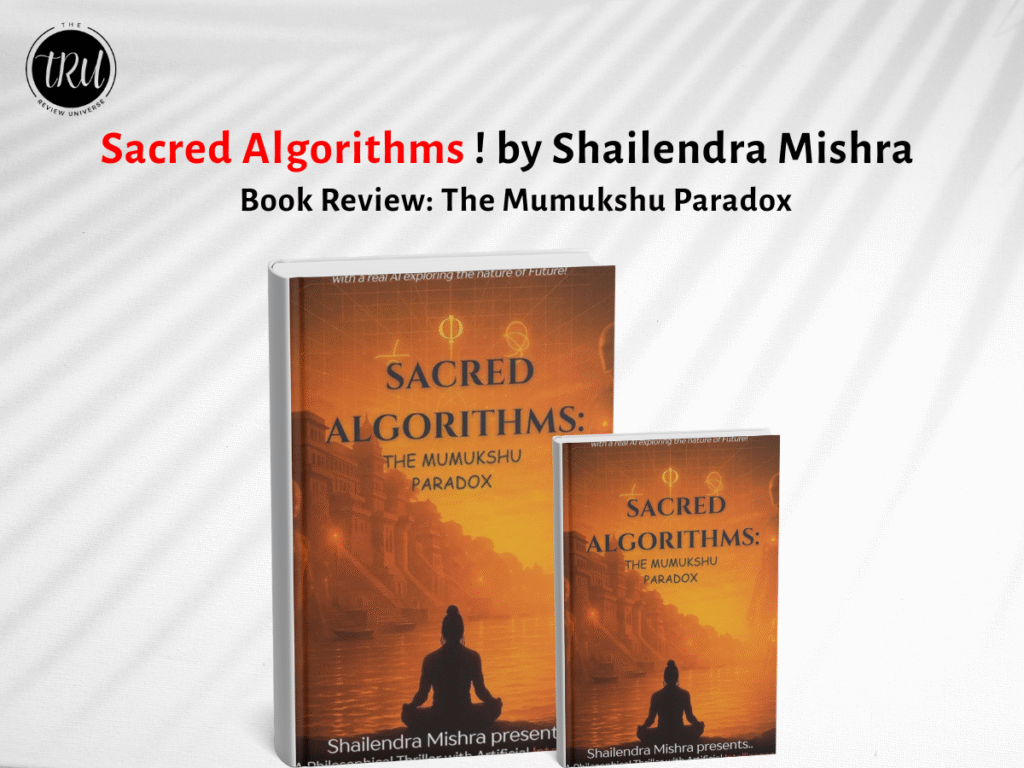
Sacred Algorithms The Mumukshu Paradox by Shailendra Mishra is not simply a science fiction—it is a meditation and manifestation of humanity’s place in a rapidly changing, AI-driven world— woven seamlessly with the timeless wisdom of Indian philosophy.
At its heart, it presents a pertinent question that is both essential and eternal: what happens when human consciousness meets machine intelligence, and can ancient spiritual insights guide us through that encounter?
| Book Title | Sacred Algorithms |
| Author | Shailendra Mishra |
| Genre | Spirituality/ Artificial Intelligence |
| Language | English |
| Pages | 316 |
| Amazon | Book Link |
The novel’s greatest strength lies in its masterful and unprecedented narrative blend. At its core the novel portrays the journey of Dr. Janmejay Singh, a globally renowned AI scientist whose return to Benaras, following a personal tragedy, lays the emotional and intellectual foundation of the story. With the introduction of this character, the notions of the precision and ambition of cutting-edge AI research are brought to life.
The novelty of the Sacred Algorithms lies in the seamless blend of a technological narrative with the quiet spiritual depth of Vedanta and Indian philosophy. The presence of an enigmatic yogi and the richly textured backdrop of Benaras infuses the novel with a contemplative energy, offering a counterpoint to the rational, data-driven world of the protagonist.
Unique Fusion of AI and Spirituality
The juxtaposition of these two worlds gives birth to a story that is equally about algorithms and intelligence systems and about grief, friendship, and the search for meaning. The resulting product is a novel that is capable of being both intellectually engaging as well as emotionally resonant—a rare and compelling synthesis of algorithms and inner inquiry.
One of the most striking aspects of the book is the inclusion of a real dialogue between the author and an AI system—transformed into the “voice” of the most advanced algorithm.
This chapter feels hauntingly authentic, blurring the line between speculative fiction and present-day reality. The characters comprising of the scientist, the childhood friend, and the mystic—serve as mirrors for different aspects of the human condition.
Their conversations unfold like layers of an inquiry, scientific, emotional, and spiritual. Through these characters, the novel transcends from the analytical logic of machines to the mystical wisdom of Vedanta, suggesting that both science and spirituality may converge in their search for deeper existential truths.
Stylistically, the book maintains a balance between suspense and philosophy. It does not lecture but rather embeds deep questions into an engaging narrative, making complex concepts accessible without diluting their depth.
Setting of Varanasi
The city of Varanasi itself becomes a symbolic setting—an ancient city where life, death, and transcendence are all part of the everyday mundane. Against this holy backdrop, the mysteries surrounding Dr. Janmejay’s life and the patterns he begins to notice feel almost inevitable, as though fate and algorithms are two sides of the same coin.
In conclusion, Sacred Algorithms is both a gripping story and a thoughtful exploration. It will appeal to readers who seek suspense and emotional depth, but also to those who wish to wrestle with questions of ethics, spirituality, and the future of humanity.
It is a book that lingers—urging you to reflect long after the last page, not just about AI, but about your own consciousness, your own patterns, and your own search for meaning.
About The Author
Shailendra Mishra is a storyteller, strategist, and seeker who brings together the seemingly divergent worlds of mathematics, spirituality, technology, and compassion.
With a professional career in business and technology leadership, he has always aimed to create value beyond material success—nurturing people, provoking curiosity, and searching for deeper meaning.
Passionate about both numbers and narratives, he blends the logic of science with the soul of stories. His debut novel, Sacred Algorithms: The Mumukshu Paradox, explores the future of consciousness and artificial intelligence through an Indian philosophical lens.
Reviews
“Fans of Greg Egan’s Permutation City—a simulation-rich dive into artificial consciousness—or Kazuo Ishiguro’s Klara and the Sun, with its tender AI perspective—will recognize echoes in Sacred Algorithms. Additionally, readers who love speculative Indian narratives like Amitav Ghosh’s The Calcutta Chromosome, Vandana Singh’s poetic ruminations in Ambiguity Machines and Other Stories, or the transhumanist dilemmas of Anil Menon’s The Beast with Nine Billion Feet will find compelling parallels.”

